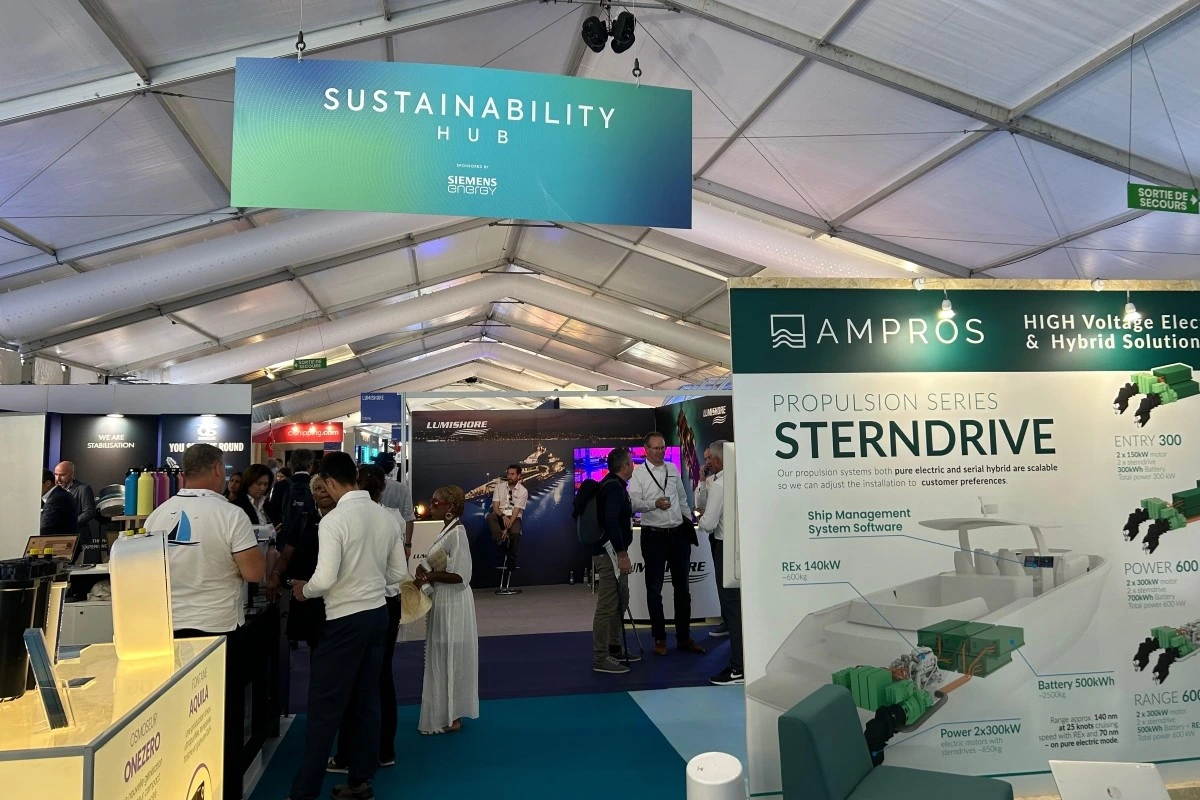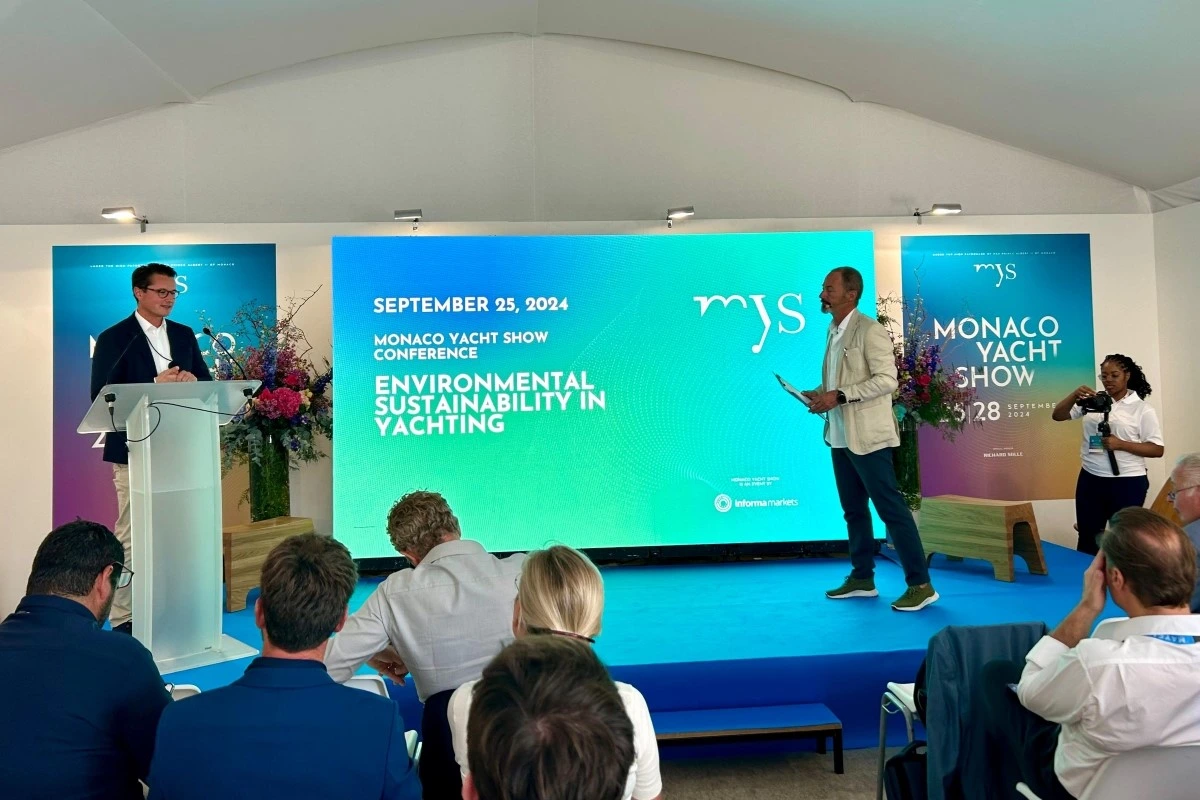The Monaco Yacht Show 2024 opened on Wednesday with a sustainability conference, where leading industry experts explored carbon footprint reduction, eco-friendly innovations, and the challenges facing the yachting sector.
The Monaco Yacht Show 2024, held from the 25th to the 28th September, is in full swing, with exclusive VIP access marking the first day of the event. Kicking off the proceedings was the opening conference, which focused on concrete actions for sustainability in the yachting industry. Monaco Life’s Niki Borisova attended the session, held at the Virage Louis Chiron Conference Hall, where key figures in the sector discussed the challenges and solutions related to reducing environmental impacts.
Sustainable Monaco Yacht Show 2024
Sustainability has become a staple aspect of the Monaco Yacht Show. Gaelle Tallarida, the event’s managing director, started the conference by addressing how this year’s event focuses on sustainability.
“We always try to continually improve over the years, even during the setup, the event, and the cleanup stages. Every year, we try to find new ways of making the yacht show more sustainably responsible,” Tallarida remarked.

This year’s show features a free electric shuttle bus for pass holders, a dedicated on-site waste management system, reusable water bottles, exclusive use of green energy and electricity, the implementation of brand new, low energy-consuming AC units, and a sustainability hub. Conferences concerning various aspects of sustainability will also occur over the three days.
See more:Interview: Gaëlle Tallarida on propelling the Monaco Yacht Show to the forefront of yachting
Jean-Marc Bolinger, CEO of MB92 Group, addressed the pressing issue of reducing the carbon footprint of older yachts. This topic is increasingly relevant as the industry seeks ways to retrofit and upgrade existing vessels to meet modern sustainability standards.
Bolinger’s approach to tackling this issue is structured and tailored into three fundamental phases: a short-term improvement plan, a medium-term optimisation plan, and a feasibility study and long-term conversion plan. Depending on the targeted sustainability goals and usage profile, each part of the yacht would be retrofitted into one of these plans.
“The feasibility study is a high-impact and high-value measure, and it is manageable, so we highly recommend it at the start of the sustainability journey,” stated Bolinger.
Regarding reducing the carbon footprint, Bolinger disclosed that the most crucial measure here would be to find fuel alternatives, such as methanol and HB2 (hydrogen and biofuel).
This discussion was complemented by insights from Robert Van Tol, Executive Director of the Water Revolution Foundation, who pointed out the importance of eco-responsible onboard practices to minimise the ecological footprint of yachts in operation today.
Van Tol proposes to look beyond carbon emissions by avoiding the carbon tunnel vision. “We need to understand where climate change comes from and what can be done about it; this goes beyond yachting,” stressed Van Tol. “We also need to take more environmental indicators into account.”
The approach that Van Tol proposes to avoid ‘carbon tunnel vision’ is the 3-R Model (reduce, remove, repair). As part of this approach, the Water Revolution Foundation, with the support of the Monaco Yacht Show, is personally handing out the reports of each of the yachts being exhibited to show their environmental transparency index so they can see how much they score in comparison with each other. “This way we inform and educate the market,” states Van Tol.
Further contributions came from Giedo Loeff, Head of Research and Development at Feadship, who delved into how technological advancements in superyachts drive sustainability within the sector and influence other industries, with examples of the solar energy industry, decking industry, and fuel cells.
“The decking material used on a yacht plays a critical role in sustainability because, if non-eco-friendly materials are used, it can significantly increase the vessel’s environmental footprint through high energy consumption during production and disposal and contribute to pollution over time.”
Challenges
The biggest challenge in the sustainability of the yachting industry is data, says Van Tol. “The industry has immense data, but it’s not organised. There is a lot of mismatched communications between the parties involved, which makes central data availability necessary to overcome this.”
Another challenge presented by Loeff is greenwashing. Sustainability is a broad concept, making distinguishing sustainable practices and greenwashing challenging. “One thing I can tell you that indicates greenwashing is data,” disclosed Loeff. “If there is no fuel reporting, for example, then that yacht is most likely greenwashing as they have not committed to a regulatory framework.”
Related article:
Interview: Gaëlle Tallarida on propelling the Monaco Yacht Show to the forefront of yachting
Monaco Life is produced by real multi-media journalists writing original content. See more in our free newsletter, follow our Podcasts on Spotify, and check us out on Threads, Facebook, Instagram, LinkedIn and Tik Tok.
Photos by Monaco Life.
